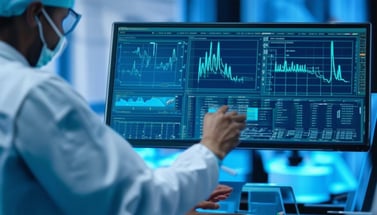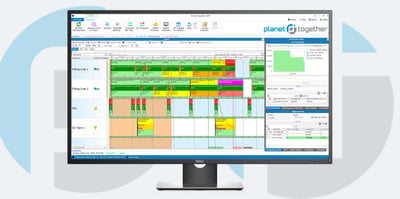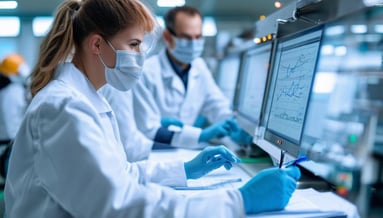Real-Time KPI Monitoring in Scheduling
In the exacting field of medical manufacturing, the role of a production planner is crucial. These professionals are tasked with ensuring that production processes are efficient, cost-effective, and timely—qualities that directly impact the health and safety of end users.
A key component in achieving these goals is the ability to monitor key performance indicators (KPIs) in real-time. The integration of advanced scheduling platforms like PlanetTogether with various ERP, SCM, and MES systems, including giants like SAP, Oracle, Microsoft Dynamics, Kinaxis, and AVEVA, is transforming how production planners manage and optimize manufacturing processes.

The Role of Real-Time KPI Monitoring
Real-time KPI monitoring allows production planners to keep a pulse on various aspects of the manufacturing process, from machine performance and production speed to quality control and inventory levels. By having immediate access to this data, planners can make informed decisions quickly, adjust production schedules on the fly, and identify potential issues before they become costly problems.

Integrating PlanetTogether with ERP, SCM, and MES Systems
PlanetTogether is a powerful Advanced Planning and Scheduling (APS) platform that integrates seamlessly with various ERP (Enterprise Resource Planning), SCM (Supply Chain Management), and MES (Manufacturing Execution Systems) systems. This integration is pivotal for several reasons:
Data Centralization: By integrating with systems like SAP, Oracle, or Microsoft Dynamics, PlanetTogether can pull data from various sources into a centralized platform. This consolidation makes it easier to monitor KPIs in real-time, as all relevant information is accessible in one place.
Enhanced Visibility: Integration with Kinaxis or AVEVA enhances the visibility of the entire supply chain and production process. This means that production planners can view not only what is happening on the factory floor but also how these operations affect the broader supply chain.
Improved Accuracy: Real-time data feeds from MES systems ensure that the information used for monitoring KPIs is up-to-date and accurate. This accuracy is critical in environments where small errors can lead to significant repercussions.

Key KPIs to Monitor
In the context of medical manufacturing, certain KPIs are particularly crucial for production planners:
Production Efficiency: This KPI measures how effectively the manufacturing process converts inputs into outputs. It is essential for ensuring that resources are being used efficiently.
Quality Rates: Given the high standards required in medical manufacturing, monitoring the quality rate of products is vital. This KPI helps identify trends in product defects or deviations from quality standards.
On-time Delivery: This measures the percentage of orders delivered to customers on time. It is a direct indicator of the effectiveness of production scheduling and supply chain management.
Equipment Effectiveness: This includes metrics such as Overall Equipment Effectiveness (OEE) which provides insights into machine performance and potential areas for maintenance or improvement.

Benefits of Real-Time KPI Monitoring
The benefits of real-time KPI monitoring are manifold:
Proactive Decision Making: With immediate access to performance data, production planners can make proactive decisions that prevent downtime, reduce waste, and optimize production schedules.
Enhanced Responsiveness: In the event of an unforeseen issue, real-time data allows production planners to respond swiftly, minimizing the impact on production and delivery.
Continuous Improvement: Ongoing monitoring facilitates a continuous improvement cycle, where processes are consistently analyzed and refined for better performance.
For production planners in the medical manufacturing industry, the ability to monitor KPIs in real-time is not just an advantage; it's a necessity. Integrating advanced scheduling platforms like PlanetTogether with ERP, SCM, and MES systems creates a robust framework that supports efficient, effective, and compliant manufacturing processes.
As technology continues to advance, the potential for further enhancements in real-time data monitoring and decision-making processes looks promising, paving the way for smarter, faster, and safer manufacturing practices.
Are you ready to take your manufacturing operations to the next level? Contact us today to learn more about how PlanetTogether can help you achieve your goals and drive success in your industry.